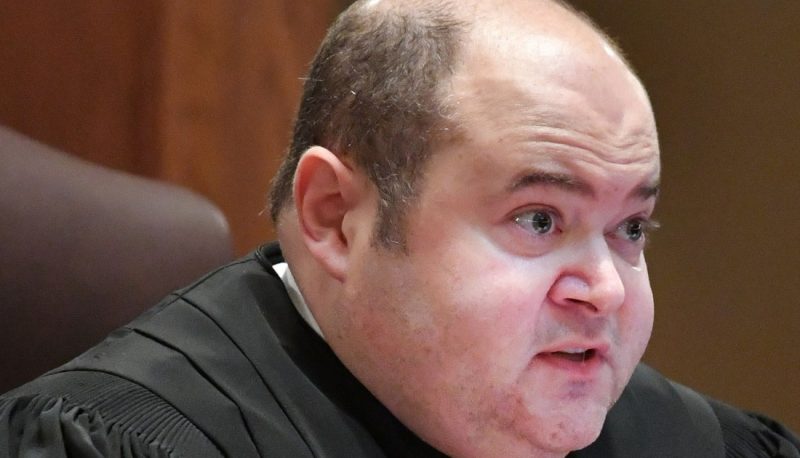“Confirmed Judges, Confirmed Fears” is a blog series documenting the harmful impact of President Trump’s judges on Americans’ rights and liberties. Cases in the series can be found by issue and by judge at this link
Trump Eighth Circuit judge David Stras argued in dissent that the court should overrule a district court and grant qualified immunity to a police officer who shot and seriously injured an unarmed man immediately after he opened the front door to his home for the officer. The majority rejected that view and upheld the district court decision that the case should go to a jury to determine whether the policeman should be held accountable for his behavior in its May 2021 decision in Banks v Hawkins.
Police officer Shelby Hawkins was sent to the home of Johnny and Vanessa Banks to investigate an alleged domestic disturbance. Although a number of facts are in dispute –for example, Vanessa contended that the couple had stopped arguing before Hawkins arrived while he claims that he heard a disturbance from inside – several key facts are clear. Johnny Banks opened the door for Hawkins, and was unarmed and did not “hit Hawkins or throw anything at him.” Nevertheless, Hawkins was “hit on the head by an unknown object” when the door was opened. Immediately after that, Hawkins shot Banks. Although Banks “survived the shooting,” he was seriously injured and the bullet “severed a nerve in his leg and clipped his femoral artery.”
Banks sued Hawkins for using excessive force and causing him significant injuriy. Although Hawkins claimed he should get qualified immunity and the case should not even get to a jury, District Judge Brian Miller, who was nominated by President George W Bush, rejected that claim and ruled that Banks should be able to present his case to a jury at a trial. Hawkins appealed.
In a 2-1 decision, Judge Jane Kelly, joined by Reagan nominee Roger Wollman, affirmed the district court decision. They concluded that the court had properly determined that it should be up to a jury to decide whether Hawkins’ use of force was reasonable, and that as a matter of law, Banks’ “right to be free from excessive force under these circumstances” was “clearly established” at the time Hawkins shot him. They explained that under prior precedent as properly understood, Banks “does not have to point to a nearly identical case on the facts for the right to be clearly established,” and that an officer like Hawkins had “fair warning” that “he may not use deadly force” against an unarmed person like Banks “who did not present an imminent threat of death or serious injury,” even if Hawkins “felt attacked earlier” by the unknown object and that the “suspect previously posed a threat.”
Trump judge Stras dissented and argued that the court should overrule the district court and grant Hawkins qualified immunity from any liability for his conduct. While acknowledging that Hawkins had made what he called a “terrible mistake” in shooting Banks, Stras maintained that the majority defined Banks’ right to be free from excessive force at too high a “degree of generality.” According to Stras, the precedent cited by the majority did not concern sufficiently “similar circumstances,” because Hawkins had been called to the scene of an “uncertain” situation and he had been “hit on the head” by an unknown object right after Banks opened the door and before Hawkins shot him. According to Stras, the majority’s ruling would not only expose Hawkins to liability but would also endanger other police officers “who may need to make split-second decisions to protect their own safety.”
The majority showed what was wrong with Stras’ arguments. In addition to pointing out that almost identical facts are not necessary in such cases, the majority noted that Stras had failed to show how being struck by someone or something other than the suspect, which the record suggested could have been a metal sign swinging from the door, can “justify the use of deadly force absent any indication that the suspect poses an imminent and significant threat of injury.” Even when making “split-second judgments,” the majority went on, officers like Hawkins “cannot ignore what they know.” The reasonableness of Hawkins’ belief and conduct, the majority continued, “is for the jury to decide.” Awarding summary judgment to Hawkins as Stras argued, the majority concluded, would “signal absolute immunity” for police for any “fear-based use of deadly force, which we cannot accept.”
This case is yet another example of Trump judges trying, and too often succeeding, to completely excuse police officers from any accountability for serious misconduct. In this case, because a majority disagreed with Stras, Johnny Banks will have the chance to get justice for the wrong done to him. In order to make it more likely that other victims of police misconduct will have a similar opportunity, it is important to confirm as many fair-minded Biden judicial nominees as promptly as possible as part of our fight for our courts.

